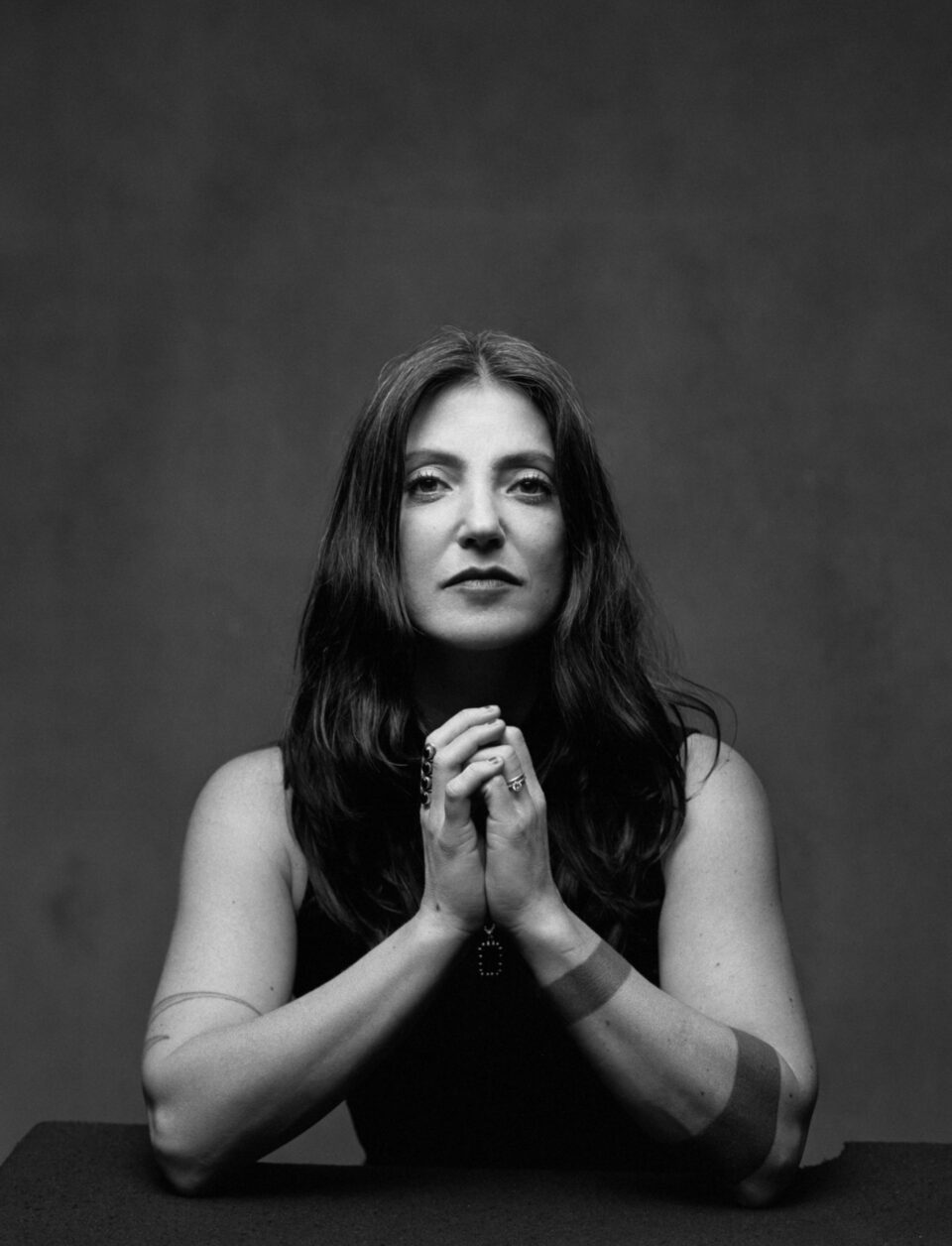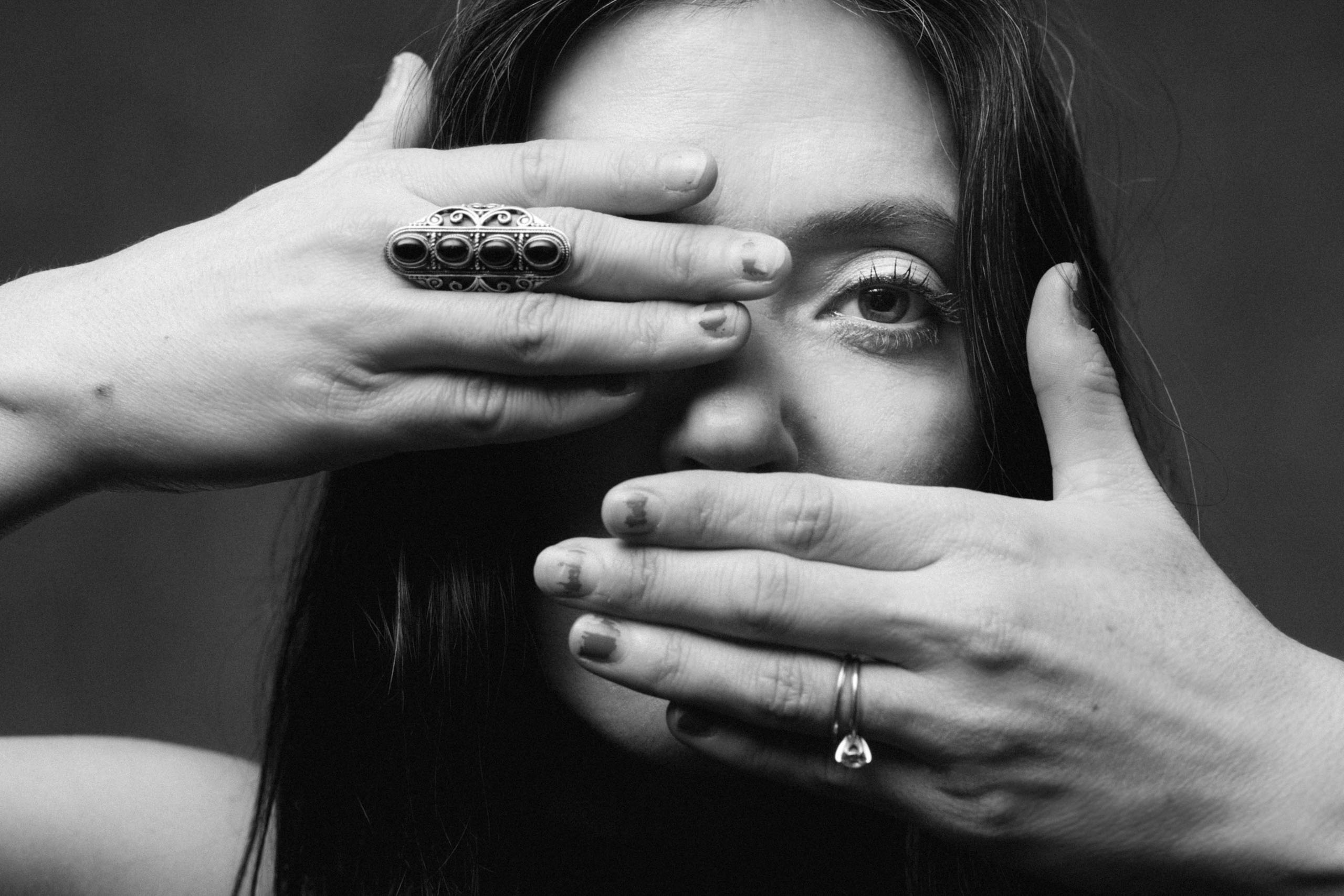Sharon Van Etten will also be taking over FLOOD FM for our “Hacked” series at 10 a.m., 1 p.m., 5p.m., and 10 p.m. PST from February 10 through 14 for a guest DJ takeover featuring hand-picked tunes and commentary. Mark your calendar and tune in here.
The latest iteration of Sharon Van Etten’s career began innocuously enough. Rehearsing for tour in support of her 2022 LP We’ve Been Going About This All Wrong, the LA-based songwriter was tired of, well, Sharon Van Etten. “We had extra time at the end of the week, and it was probably the last day and we had a couple hours left,” she explains from a comfortable kitchen in a beautiful Brooklyn apartment that belongs to a dear friend. “I got to the point where I was just really tired of hearing myself and making everybody else listen to me sing about me.”
Van Etten has always been the star of her own show, though it was never really by design. Soft-spoken and both inquisitive and empathetic, she’s always used songwriting to work through her feelings about the self as well as about family, friends, destruction, chaos—all the hits, really. On that day in the California desert where she and her band rehearsed the arrangements, she’d exhausted that outlet, too. But joined by her now-full-time band of Jorge Balbi, Devra Hoff, Teeny Lieberson, and Charley Damski (who departed before the official writing process began to go on tour with Lana Del Rey), Van Etten had a request. “First, can we take a break?,” she recalls asking before trying to bury the kicker: “And then when we’re back can we just…jam?”
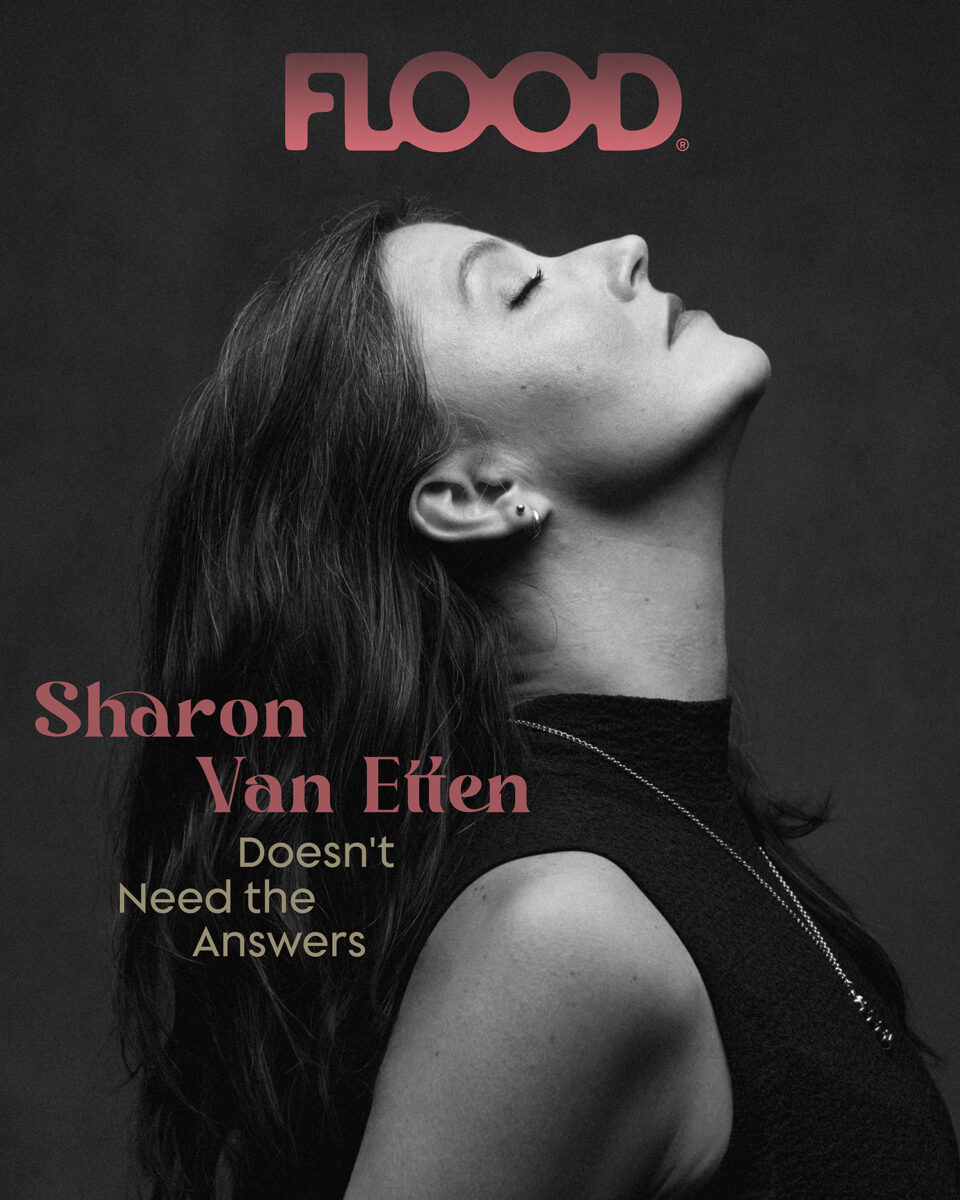
Van Etten was a bit shy to even utter the term. It became a running joke with the group. “I hesitated to say the word—it can have negative connotations—but there was no better word for what I was trying to do,” she recalls with a laugh. “I was trying to let go and just play without it having to be anything, because I was very inspired by the instrumentation that we were working with that whole week.” So they just played and played and played and wrote two songs that eventually made their way onto Van Etten’s seventh LP, and her first with a band: Sharon Van Etten & the Attachment Theory. “I Can’t Imagine (Why You Feel This Way)” and “Southern Life (What It Must Be Like)” were penned during that very first impromptu session. “I remember going home with this little spark, knowing what I needed to do next,” she says.
Instead of writing on her own, though, Van Etten spent the next week at home in LA waiting patiently for her “Wild Hearts” tour alongside Angel Olsen and Julien Baker to kick off. During that run, the band began perfecting the energy that helps make The Attachment Theory one of the best rock albums of the past few years and a new highpoint in Van Etten’s unrelentingly strong discography. After the run, it was another week in the desert to continue the writing process, this time in the Yucca Valley. After a week there and another week at 64 Sound in Highland Park, Sharon Van Etten & the Attachment Theory were ready to record their new album.

“I got to the point where I was just really tired of hearing myself and making everybody else listen to me sing about me.”
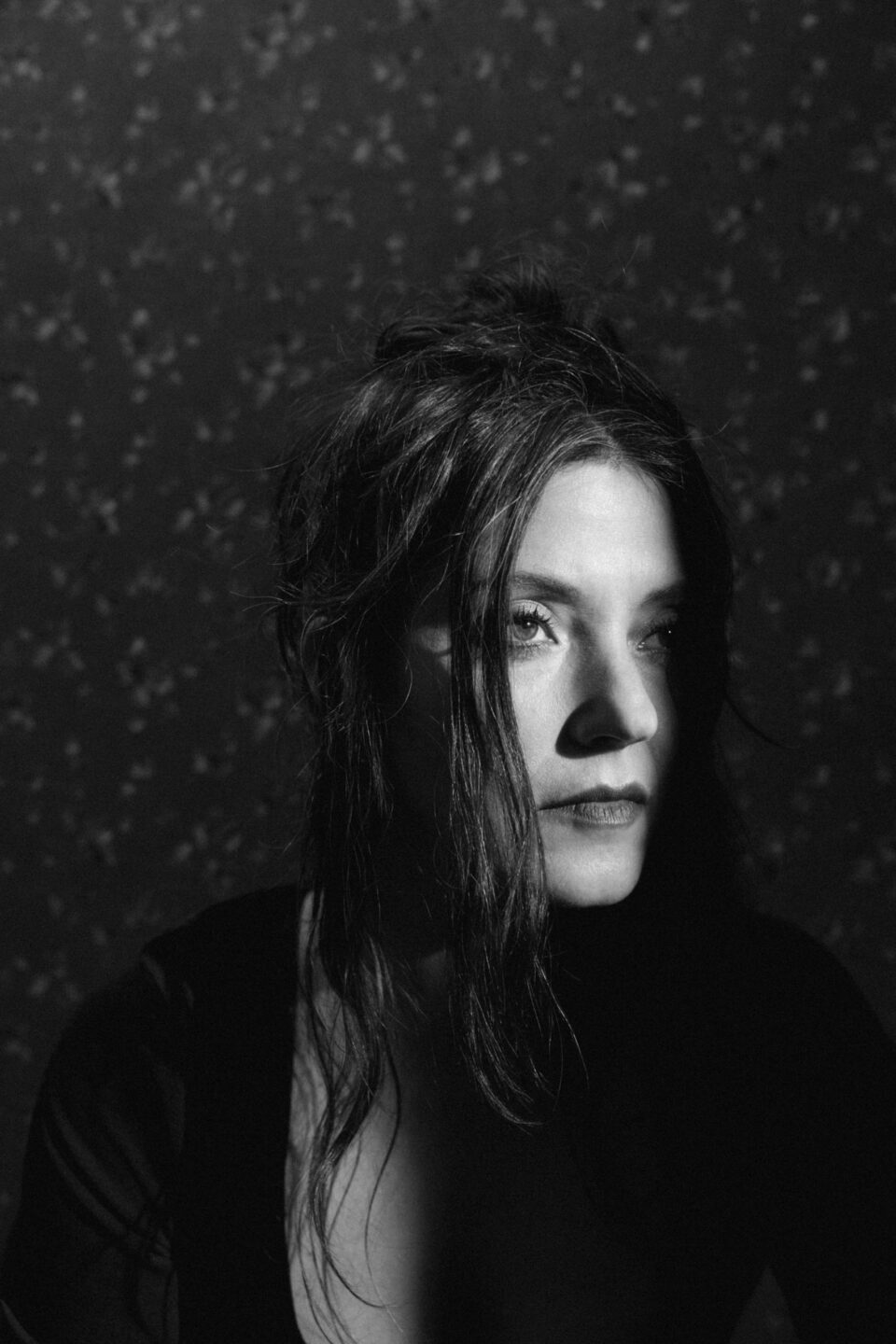
Though the music on The Attachment Theory forges relatively uncharted land within her musical world, these are ideas that Van Etten began toying with back when she was recording her 2019 album Remind Me Tomorrow. “[That] was the first time I was able to explore this sound in the studio. [Producer] John Congleton pushed the envelope with me,” she explains. “I had all the demos written, and gave him my references, which were Nick Cave’s Skeleton Tree, Portishead, and Suicide. That was the beginning of exploring that palette. It was very exciting, and I think that’s what inspired We’ve Been Going About This All Wrong, because I started getting obsessed with synths during COVID.”
Though Van Etten had been circling the sounds she embraces on The Attachment Theory, the record marks a decisive step toward shoegaze, coldwave, post-punk, glam rock, and art pop. “As soon as we started writing the songs, I already felt like it had a UK vibe,” she explains—a feeling that was fostered by a band outing to see The Cure at The Hollywood Bowl before hitting the studio. “There’s a lot of Joy Division and The Cure here, but there’s also Kate Bush and Brian Eno, plus some American groups like Pylon and ESG.”

To keep these distinctly British themes going, Van Etten discussed recording the album in London with producer Marta Salogni, who suggested they could record at The Church Studios, where they would eventually spend three weeks. Once owned by Dave Stewart of The Eurythmics, the space was also briefly managed by David Gray before Paul Epworth took it over. Everyone from Oasis to Beyoncé to Paul McCartney to Nick Cave has recorded there. “I read all the history and I thought, ‘How do I not do this?’” Van Etten shares. “So many of our influences have recorded there.”
From the first synth rumble of album opener “Live Forever” to the expansive, patient, and contemplative chorus, things are clearly different on The Attachment Theory, which buzzes with the energy of The Church. The album is still from Van Etten’s perspective, an examination of the world she lives in, though her gaze is now firmly situated on family and mortality, the result of being a devoted wife, the mother to a growing child, and a bandleader for a group of people who have evolved from hired guns to some of her best friends. There’s less “I,” more “us.” She finds herself in a new world, eager, excited, contemplative, scared, downcast, and probing. Everything was written as a band, and a lot of the lyrics derived from conversations about politics, family, and friendship they would have as a group while decamping on those week-long writing retreats.

“As soon as we started writing the songs, I already felt like it had a UK vibe. There’s a lot of Joy Division and The Cure here, but there’s also Kate Bush and Brian Eno.”
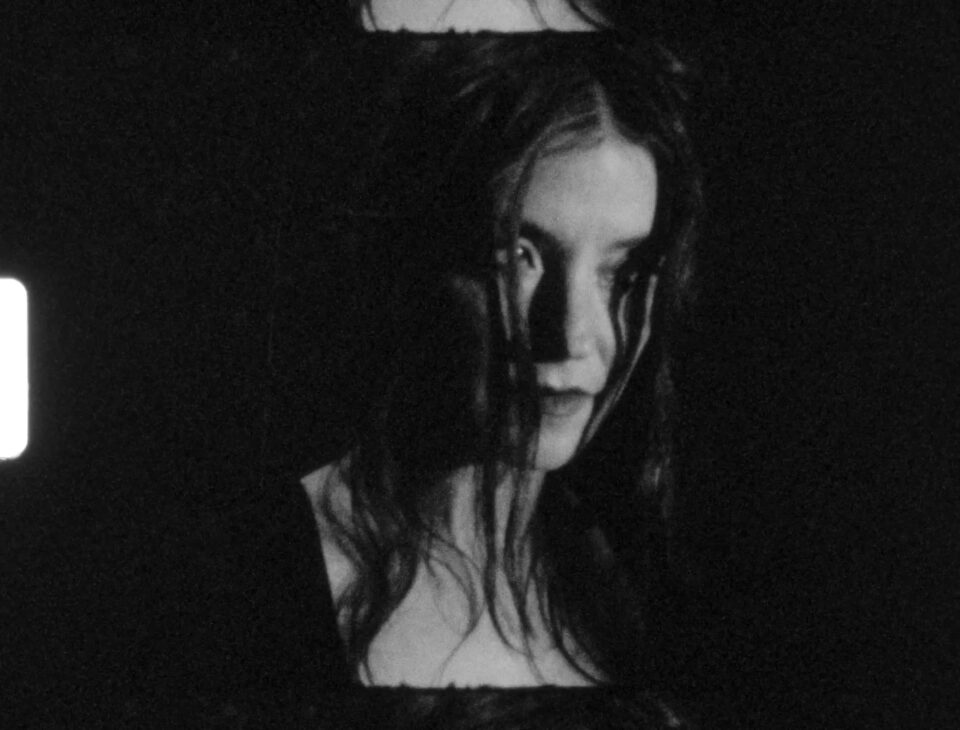
To call Sharon Van Etten & the Attachment Theory death-obsessed is doing the project’s subtlety an injustice, but it’s clear that Van Etten and her bandmates are also reckoning with age-old existential questions that will remain unanswered long after we’re gone. On “Live Forever,” Van Etten asks again and again: “Who wants to live forever?“ The caveat: “It doesn’t matter.” The question and answer are equally unnerving, but when the synth pads are kicked out of the room by Balbi’s live drum sound, all angst slips away—at least for a few minutes. Music isn’t a cure, but it is a balm.
The impetus for the song, and much of The Attachment Theory, comes from Van Etten and her bandmates approaching or being in their forties, entering what’s sometimes called “the Sandwich Age.” It’s a uniquely difficult time for many who begin to face their own mortality through their aging parents and growing children—plus, the achy backs and slow recoveries that escalate as one approaches middle age. “The Sandwich Generation is those who are caring for two different generations,” Van Etten explains. “It’s intense and you’re still working and still caught up in your own life to try to take care of everyone. I feel that with my bandmates and what they’re going through in their lives, and also what’s happening in the world. Everything just feels like it’s closer and closer.”
What “everything” refers to is something Van Etten doesn’t expand upon. It’s all of it, I assume: the joys of being a part of a family, the support of great friendships, the heartbreak of losing the people who raised you, becoming their caretaker toward the end.

After “Live Forever” comes “Afterlife,” which doesn’t exactly dispel the notion that The Attachment Theory is fixated on the grave. Despite this, the band cooks up a sugary-sweet instrumental to mask the fear, giving the song a twisted irony as Van Etten asks: “Will you see me in the afterlife? / Will you tell me what you think it’s like? / Come and tell me it’ll be alright? / Will I see you in the afterlife?” For Van Etten, having answers to these questions is less important than cultivating a community that makes you want to live, that makes the afterlife seem like just more time spent with the people you love. You want to create a world where you’re not even interested in what might be next.
The attachment theory, developed by psychiatrist and psychoanalyst John Bowlby, examines the ties between humans, emphasizing in particular the relationships between caretakers and infants, and how this tie is crucial to development. It’s a concept Van Etten has been interested in as a member of the Sandwich Generation, as ideas of parenting and motherhood affect every aspect of her life. “The band joked that they all spend their time in therapy talking about the attachment theory, so they didn’t want to think about it all the time while playing music,” Van Etten laughs. “But we all come from very different backgrounds, geographically and musically, and we’ve now found each other. We’re now each other’s chosen family in this way that’s way bigger than I ever could’ve imagined when I first started playing music.” Attachment lingers into adulthood.
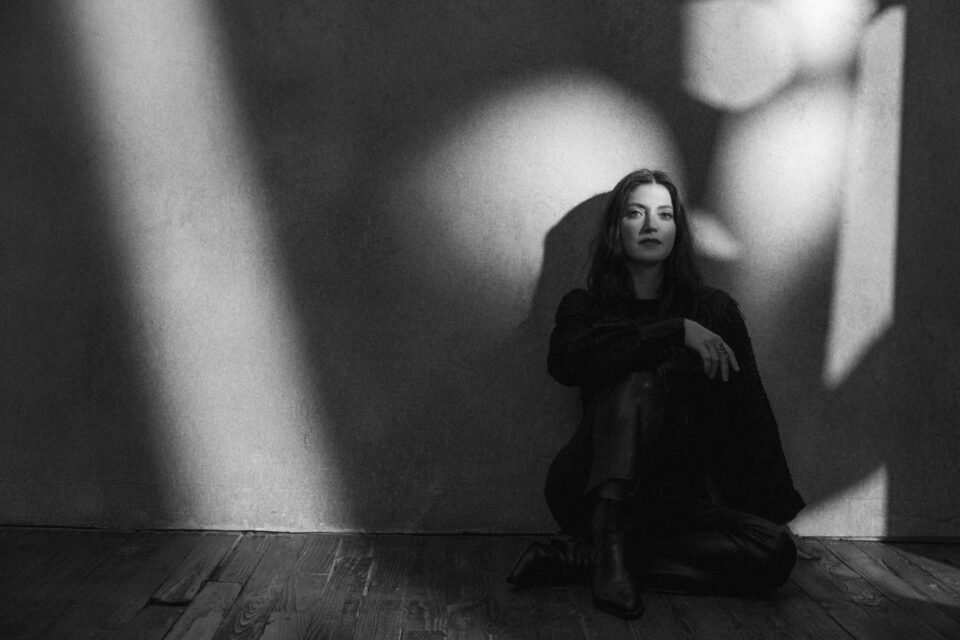
“We’re now each other’s chosen family in this way that’s way bigger than I ever could’ve imagined when I first started playing music.”
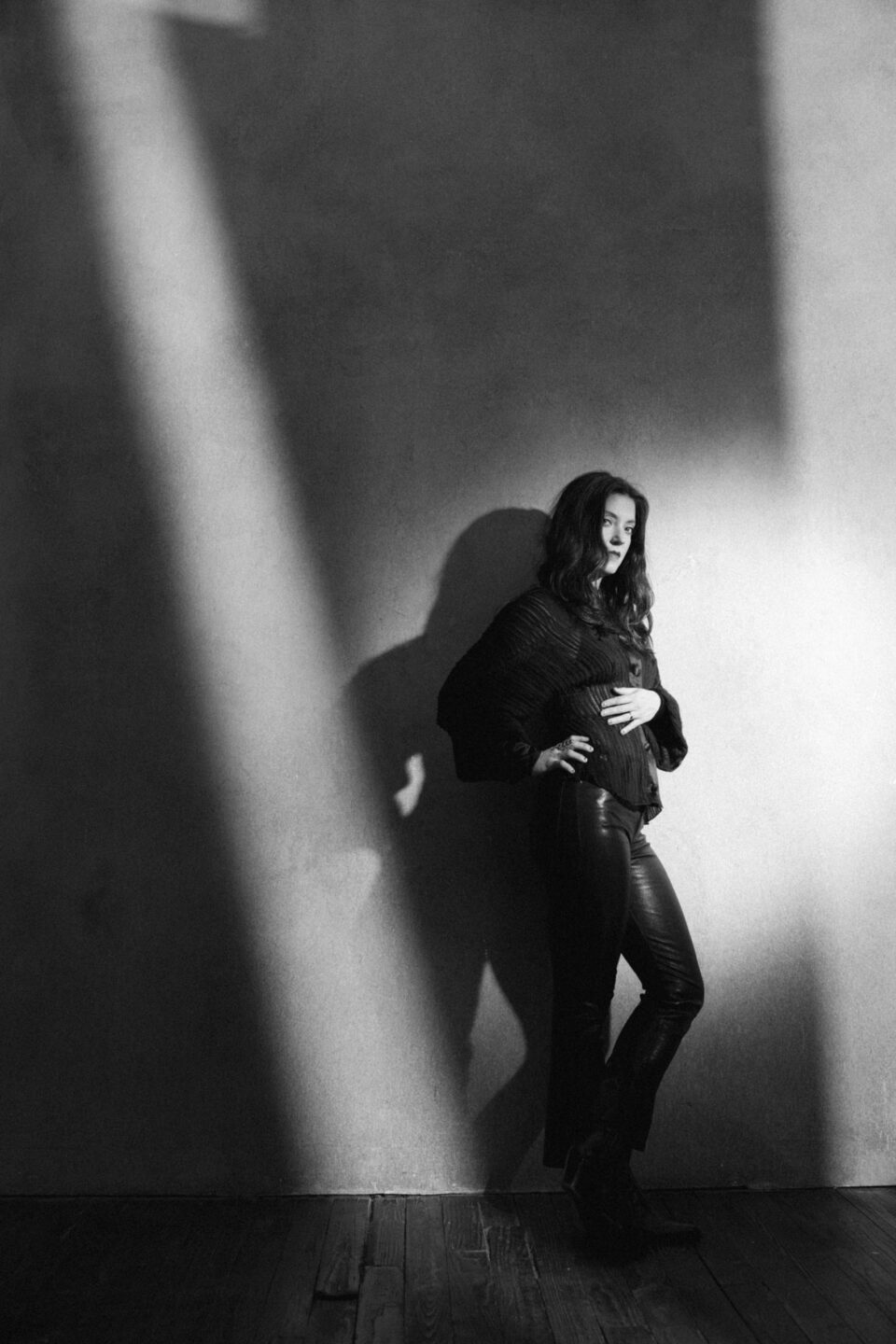
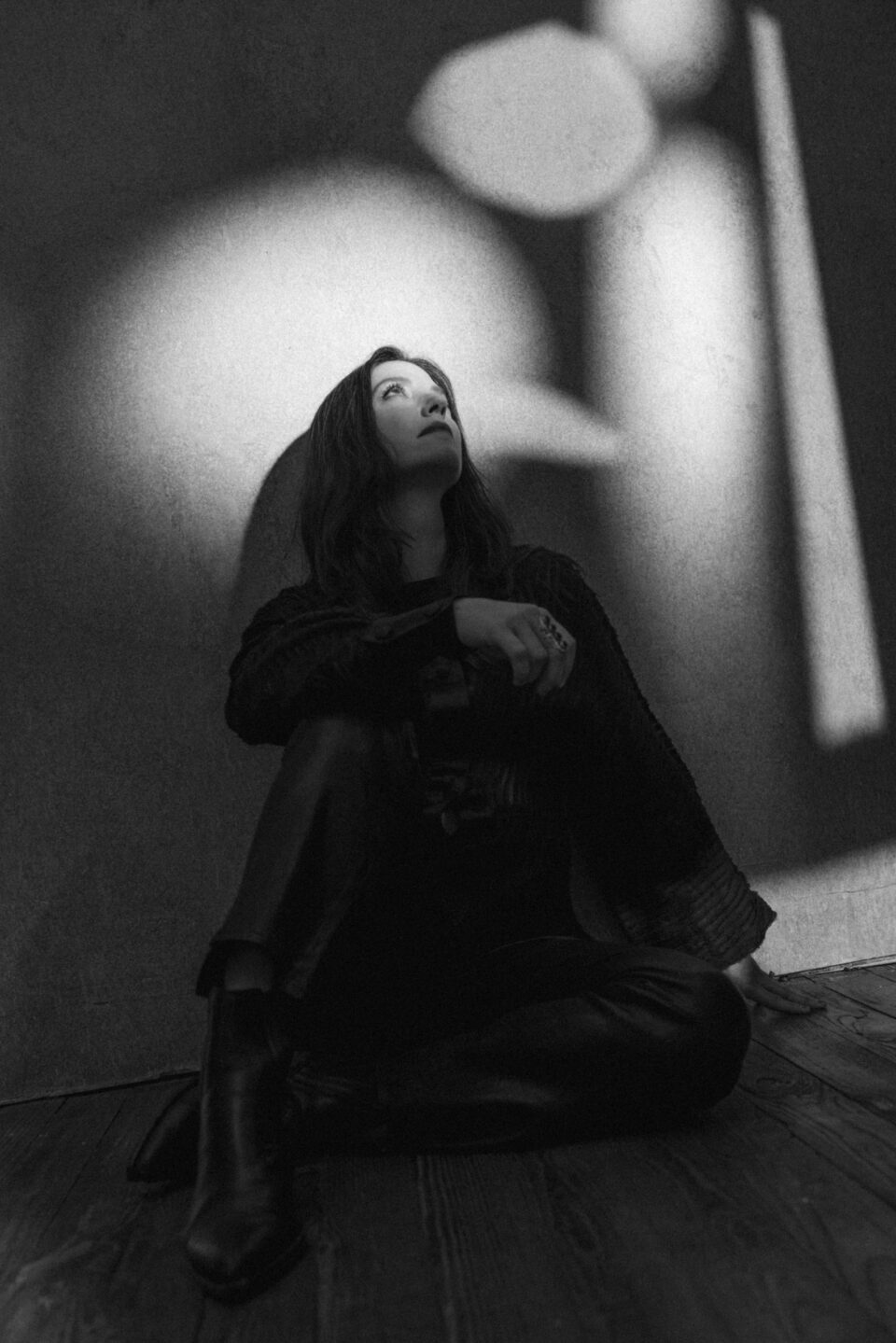
Van Etten began her career performing by herself with an acoustic guitar on tiny New York City stages. Now, she has a band to call her own, a group of friends that exists both within the confines of The Attachment Theory and continues after the gigs end, the sessions are wrapped. “A huge part of why I wanted to name the band and write from the ground up with the band is that I wanted to nurture my community and my family and invest in our friendships and be more vulnerable.”
There’s a line on the album’s penultimate track, “Fading Beauty,” that stuck out among many favorites the first time I listened to The Attachment Theory. Van Etten sings over pulsing synths and muffled bass drum quakes: “The inherent beauty of life / The faded beauty of light.” Later on, it’s as if she changes her mind when she adds: “The inherent beauty of light / The faded beauty of life.” It’s an examination of what in our lives is a priori versus what’s learned. Van Etten is mother and child and self, watching aging processes dance around each other like sparks from a freshly lit fire. “I think about aging in another way on this record: not just living forever, but seeing the aging in my parents, and even in my kid and in myself,” she explains. “There’s something really beautiful about aging, even though it’s also scary.”

Scared beauty is a nice subtitle for Sharon Van Etten & the Attachment Theory. The album is a celebration of love and the highpoints that make life worth it. But all that goes away. Everything that was once so permanent slips through our fingers and we’re left with our hands, almost unrecognizable with how they’ve aged. Yeah, it’s terrifying. It’s also spectacular. Sharon Van Etten & the Attachment Theory is a chronicle of those miracles.
Toward the end of our conversation I ask Van Etten if she’d want to live forever if she could. She pauses for a moment before realizing that she has an easy out: “It doesn’t matter,” she says with a sly smile, quoting her own lyrics. Fair enough, but it’s not ambivalence that animates The Attachment Theory; it’s an optimism, a joy, a search for love in the face of the unknown. Searching for more clues, I ask a variation on the only question musicians truly hate to answer: “If this new album was a book, what does the back cover say?” Earnest and confident, but unwilling to reveal her full hand, Sharon looks me in the eye and offers one more smile, before stating matter of factly and with certainty: “This isn’t the end.” FL
